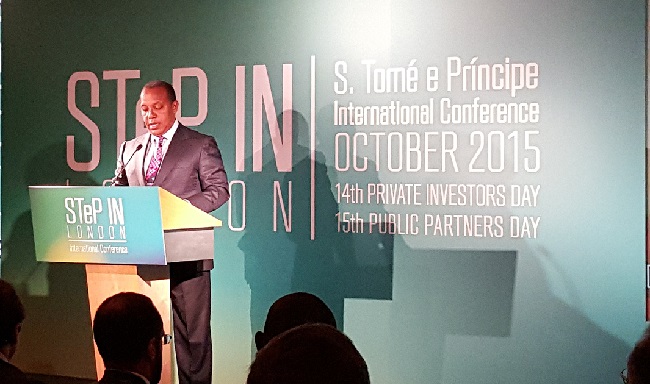Sao Tome courts investors, development partners
“We are a small, flexible, reform-minded country trying to build from a base of almost nothing and we are well positioned to capitalise on the surrounding wealth of the West and Central African region”
The Prime Minister of São Tomé e Príncipe Patrice Emery Trovoada, made this statement in his address to delegates at ‘STeP In London’, the country’s first ever International Conference for Private Investors and Development Partners.
The delegation from São Tomé e Príncipe used this two-day investment and development roadshow, which took place last week in London, to forge stronger links with the investment community all over the world.
The meeting brought together a select group of private investors and members of the business community to discuss opportunities that concern the country’s national strategic agenda.
In all, 26 different countries attended the meeting on Wednesday, with representatives from 32 multilateral and bilateral institutions taking part in the partners’ roundtable discussion on Thursday.
Keynote speaker at the event was former Nigerian President, Olusegun Obasanjo, who used the platform to urge investors to capitalise on São Tomé e Príncipe’s main assets: security, peace, political stability and geographic location.
In his keynote address, he drew similarities between the islands transformation agenda and Nigeria’s investment and development drive when he was in office.
He told delegates that: “Today, São Tomé e Príncipe is like a lion cub, but tomorrow it will be a big African Lion. So when that time comes, it will be good to have a lion for a friend”.
Prime Minister Trovoada opened the conference by saying that the exclusive event in London was designed to interact with quality players, who were flexible and global, coming from emerging markets or mature economies, and those are looking for diversification.
He said that after 40 years of independence and 25 years of democracy, his country possessed a driven spirit for reforms. São Tomé e Príncipe had adopted a pragmatic decision-making approach to enable radical changes from the past decades.
“We have a clear understanding that only the private sector can create a sustainable economy, wealth and enough jobs to secure social cohesion”, he said, adding that “Governments should carefully understand the needs of the investors and allow them to benefit from continuous and updated reforms that are versatile, pragmatic and respectful of global practices”.
To the development partners, he said that that his country needed the support of the international community to support the transformational agenda, but he reiterated that first and foremost, the people of São Tomé e Príncipe needed to rely on themselves and their assets. He stressed the importance of owning the economic transformation plan, in order to achieve sustainable development.
In setting the scene, he posed some important facts and questions. The country is surrounded by the wealthiest countries in Africa, and he asked how São Tomé e Príncipe can leverage this to attract some of this wealth, either in the form of tourism or in the form of investment and business opportunity. He also asked how a country could position itself to become a trusted partner of its neighbors, as opposed to being seen as a dangerous competitor.
He articulated the country’s Transformation Agenda, explaining how it evolves around three economic pillars: 1) the deep-water trans-shipment port as a maritime hub for the Gulf of Guinea; 2) the international airport as the regional aviation hub; and 3) the “do-business-easy” legal and fiscal infrastructure in dedicated areas.
Implementing the ambitious strategy has already begun with the signing of an MOU with a Chinese group to build a deep water port that would serve as a trans-shipment port to service the region. Currently much of that traffic is going through the Canary Islands.
A private investor, Eduardo Camuno, former CEO of specialist agricultural commodities merchant, ED&F Man, described ‘STeP In London’ as ‘a rare event’ that showcased a government with a clear, reliable and long term implementation plan, and one that showed a willingness to work effectively with the private sector through dialogue and partnership on the opportunity, the risks and the remuneration.
In his presentation on Business, Fiscal and Tax Policies and their implementation, Mr Tiago Caiado Guerreiro of Caiado Guerreiro & Associates referred to São Tomé e Príncipe as ‘an uncut diamond’ adding that ‘it is a perfect place to do business, well localized to service an extremely wealthy area and with the potential to be a Singapore, Switzerland, Luxembourg – with subtle differences, of course”. It could, he said, become a ‘one stop shop’ for investors.
Conveniently located between some of Africa’s largest economies, notably Nigeria and Angola, São Tomé e Príncipe is Africa’s second smallest country after Seychelles. It has ambitious plans as it positions itself as a hub for the Gulf of Guinea and it wants to create a logistical hub to service West and Central Africa, as well as becoming a tourist hotspot for expats working and living in the region.
Armando Cabral of McKinsey and Company gave an assessment of the island nation’s potential for tourism and agriculture. In his presentation on how the private sector can be an engine for growth, he highlighted the country’s potential for premium, high value, high-end tourism, in an area which is currently the 8th least visited country in the world.
“São Tomé e Príncipe is developing a vision that is based on the countries core assets and integrating its strategy for creating value adding private investments” he said.
Citing the just-launched 2015 Mo Ibrahim Index of African Governance, in which the central African island nation showed a positive overall governance trend ranking 13th out of the 54 African countries surveyed, PM Trovoada concluded: “We are a credible, robust, attractive, trusted partner and ready for your business.”
African Media Agency


